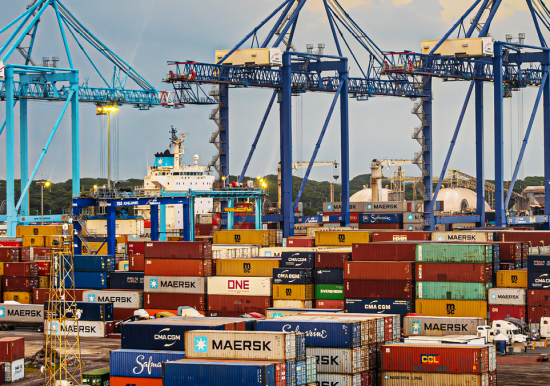
2022 Chandler Good Government Index Insights
Strong links emerged in this year’s data between the CGGI’s rankings and COVID-19 outcomes, social mobility, and more.
The inaugural issue of the CGGI, published last year in the middle of the COVID-19 pandemic, was built on data that predated the pandemic. This year’s CGGI includes data that was captured from 104 countries during the pandemic, which means that comparing the two Indices offers a data-driven snapshot of how the pandemic has affected governments’ capabilities and outcomes. Such a range of data—the CGGI covers 104 countries, or roughly 90% of the world’s population— allows us to explore a variety of questions: How has COVID-19 affected certain government capabilities? Did countries with higher CGGI scores have better COVID-19 outcomes? What might this year’s results tell us about the nature of good governance more broadly? Here’s what we found.
Overall Country Rankings Were Relatively Stable—Despite a Volatile Year
Roughly one-third of countries in the CGGI (33) maintained the same overall ranking, including the top overall country (Finland) and the lowest-ranking (Venezuela). The biggest climbers were Mongolia and Ukraine, which each improved their overall ranking by eight places. The largest declines in the overall rankings occurred in Bosnia, Peru, and Zambia, which fell five spots from their 2021 rankings. The relative stability of the overall rankings can be attributed partly to the CGGI’s focus on capabilities, rather than outcomes. When we refer to capabilities, we mean systems, institutions, processes, skills— elements that take years to build and develop, and which are more likely to gradually erode than abruptly collapse. This focus is by design: capabilities represent enduring foundations for excellence in governance; they are stable and lasting investments in the present and future. We do not expect to see country rankings soar and dip each year.
Good Governments are Better Prepared for Pandemics
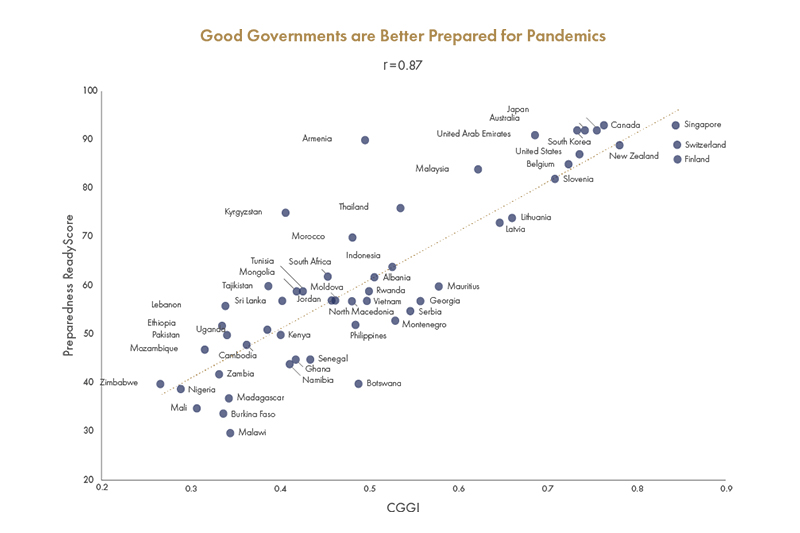
Good Governments Have Better Health Security
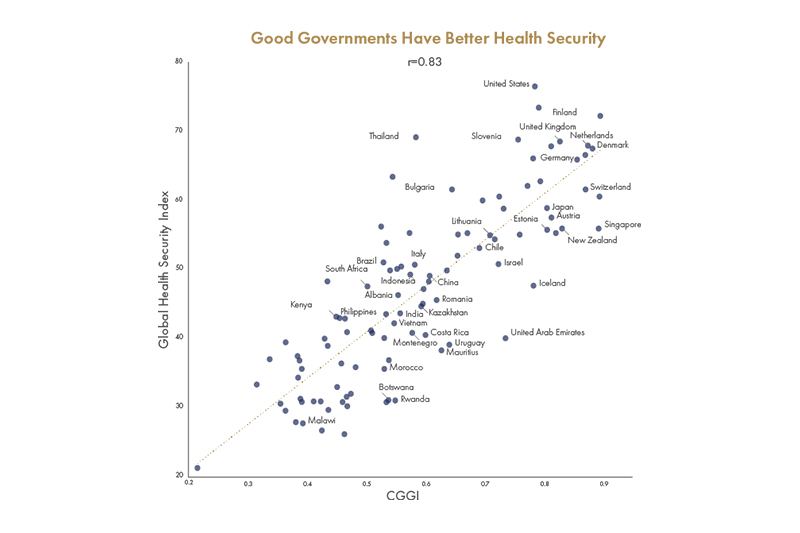
Good Governance and COVID-19
1) Good governance explains the difference in pandemic preparedness between countries better than GDP per capita
According to the CGGI’s rankings, a country’s governance quality is a better predictor of whether it is prepared for pandemics than its income level. In other words, a well-governed country is more likely to be prepared for a pandemic than one which is simply wealthy.
A strong relationship emerged when we compared countries’ CGGI scores with their Prevent Epidemics ReadyScore, an assessment developed by Vital Strategies, a global public health organisation. A similarly strong relationship was indicated when we compared countries’ overall CGGI scores with their rankings on the Global Health Security Index, an assessment developed by the Johns Hopkins Center for Health Security, the Nuclear Threat Initiative, and the Economist Intelligence Unit.
Such findings, while telling, might also be expected. Both the Global Health Security Index and the Prevent Epidemics ReadyScore assessments focus on preparedness, a kind of capability or capacity—just as the CGGI itself focuses on government capabilities. As we shared in last year’s report and find once more in this year’s Index, there is a strong link between a government’s capabilities and the outcomes it produces. However, when it comes to COVID-19, the data below shows that the story is a little more complicated.
2)There is a moderate relationship between good governance and COVID-19 outcome
When we compared a country’s overall CGGI score with the number of excess deaths per 100,000 people over 65 years old, a reasonably strong relationship appeared: well-governed countries had fewer excess deaths from COVID-19 than poorly governed countries.
Why did we choose excess deaths, rather than the official reported deaths—or why didn’t we choose another COVID-19 outcome altogether? For a number of reasons, excess deaths are seen as a more accurate measure of a country’s COVID-19 response than its official reported deaths. Countries have different definitions of what constitutes an “official” COVIDrelated death. There is an important distinction, for instance, between someone dying from COVID-19 and someone dying with COVID-19. Excess deaths can also help account for demographic discrepancies between countries.
Among COVID-related outcomes, excess deaths are particularly robust and representative. Reported COVID-19 infection rates, for instance, depend heavily upon a country’s testing ability. Theoretically, a country that made testing readily available and accurately collected data would perform worse by that metric than a country that made no testing available or did not accurately collect the data. Overall assessment scores of a country’s pandemic response are often built on such data—not to mention that the nature of a “successful” response has changed as the virus has mutated and vaccines have become more available.
Good Governments Tend to Have Better COVID-19 Outcomes
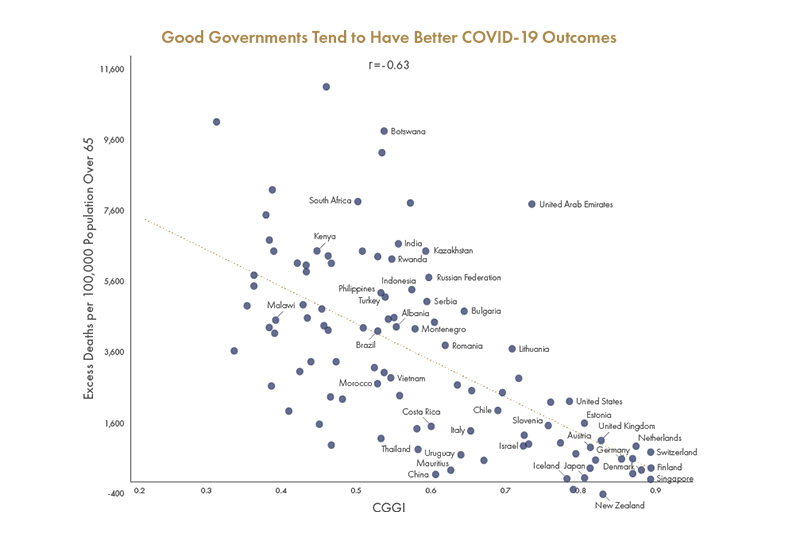
Good Governments Have the Capability to Perform More Tests
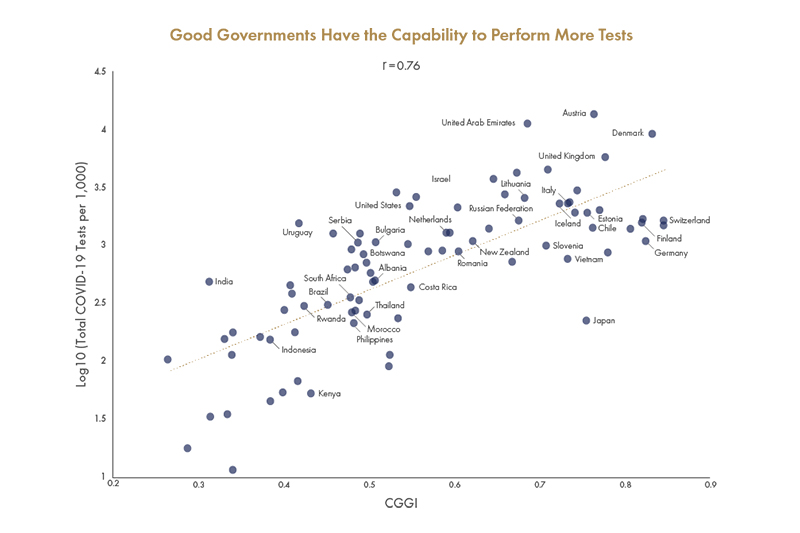
As the chart shows, the relationship between good governance and COVID-19 outcomes is not as strong as the link between good governance and pandemic preparedness. This raises interesting questions not unique to COVID-19: why, and how, do capabilities translate—or fail to translate— into outcomes?
In this particular instance, part of the answer is unique to COVID-19. A successful pandemic response is complex and multi-faceted. It involves several factors: access and attitudes toward vaccinations, trust in government and public health bodies, leadership styles, and obesity rates, among many others. Not all of those are within a government’s control but can powerfully reinforce—or undercut—the effectiveness of a government’s response.
Another outcome that we analysed was COVID-19 testing per 1,000 people. Again, we found a fairly strong relationship with a government’s CGGI score: good governments conducted more COVID-19 tests. Given the CGGI’s focus on capabilities, this suggests that well-governed countries have a higher institutional capability to manage, run, and coordinate tests.
What Do This Year’s Findings Reveal About the Nature of Good Governance?
Three Capabilities Are Most Closely Correlated with Good Governance
The CGGI is built on 35 indicators drawn from more than 50 publicly available data sources. Of those 35 indicators, 26 focus on capabilities.
When we looked at the data this year, we found three capabilities in particular that were most closely correlated with a country’s overall CGGI score:
1. Rule of law
2. Property rights
3. Anti-corruption
These three capabilities are essential factors in determining good governance, and sturdy foundations for national development and flourishing. Their presence suggests several other healthy behaviours and processes are being implemented—ones that prevent money from being siphoned, for instance, or the law being selectively applied. These are the cornerstones upon which trust-based societies and economies are built.
Good Governments Have Higher Social Mobility
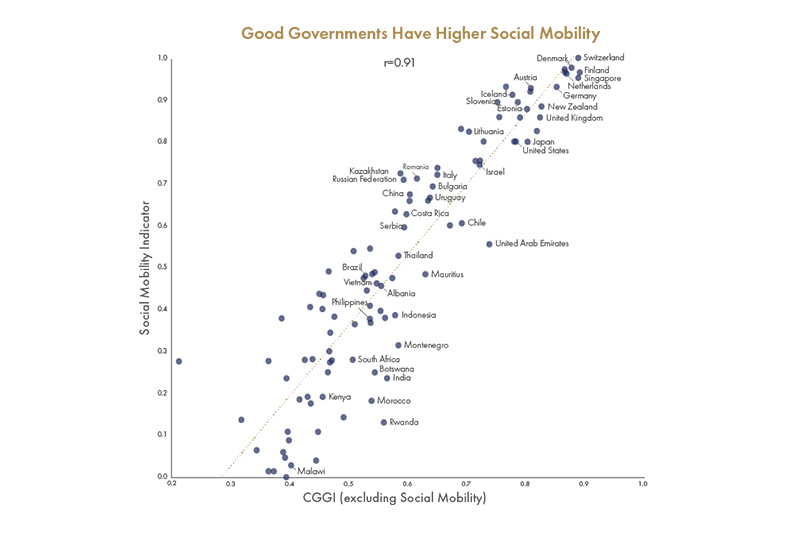
The Outcome Most Closely Related with Good Governance: Social Mobility
While the CGGI is capability-focused, it also looks at nine equally weighted outcomes—because the outcomes a government produces clearly matter in assessing its performance. These nine outcomes comprise a pillar called “Helping People Rise”, and range from education to healthcare, income inequality, and personal safety. They are vital components of human well-being and government performance, yet none was as closely related to good governance as social mobility, as measured by the World Economic Forum.
The CGGI defines social mobility as “the extent to which socio-economic circumstances at birth influence a person’s future status and prosperity.” Our findings suggest that good governance—not ideology, income-level, or geography—is what determines the extent to which countries create opportunities for their people to rise on the basis of their creativity, work ethic, and contribution.
More Stories


Global Influence & Reputation Country Snapshot: Türkiye
